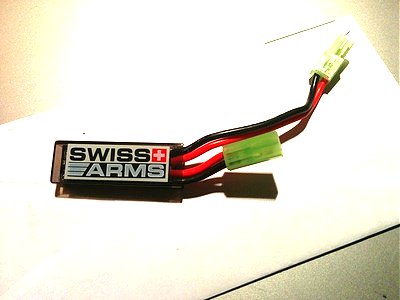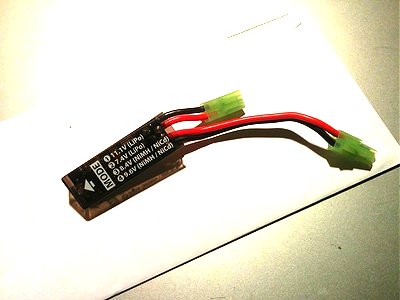
45 Users Online
Revision: 20150325_051639 | All Revisions
The Swiss Arms Programmable MOSFET Burst Unit is an electronic device that attaches between your airsoft gun and your airsoft battery. It provides a number of features, which we will explain in this review article.
Feature #1: The primary reason for airsoft programmable burst control unit is to provide a bit of realism to your airsoft gun. The realism is driven by many real steel rifles that can fire in burst mode. For example, the M16 fires three-round burst. By using a programmable burst control unit, your airsoft rifle can fire in burst mode as well.
Feature #2: The basic airsoft electronic gun (AEG) is quite simple. Your trigger closes contact from the battery to the motor. This simple contact does not provide consistent voltage and current draw, which translates to inconsistent firing and potential burning of electrical wiring. The MOSFET portion of the burst unit solves that problem by providing consistent voltage and current to the motor.
Feature #3: Battery cut-off to prevent over-discharge of sensitive batteries. This feature primarily targets LiPo and LiFe batteries, where over-discharge can create a fire hazard and damage the battery.
Now that we all know what a burst unit does, let's look at the Swiss Arms Programmable MOSFET Burst Unit. The burst unit, shown in the photo below, is a small circuit board encased in a hard transparent plastic. However, the transparency is rather useless as it is covered by logo and other labeling. There are two mini Tamiya connectors. The female connector connects to the airsoft gun, while the male connector connects to the airsoft battery.

This burst unit is probably one of the simplest burst unit on the market. There are only two adjustments you can make: 1) select the type of battery; 2) change the burst rounds. Sadly, no instruction is included with this burst unit. So this web page will serve as the instruction as well.
This burst unit works with four different battery types (see photo below): 1) 11.1v (LiPo); 2) 7.4v (LiPo); 3) 8.4v (NiMH/NiCd); 4) 9.6v (NiMH;NiCd). The fact that you have to manually change the battery type and voltage, makes it difficult to use when you carry different batteries on the field. You can solve that problem by limiting yourself to one battery type.

There is a tiny little hole on the bottom of the enclosure. To change the battery type, you have to stick a small pin through the hole to press a button on the circuit board. That means you also have to carry this small tool with you.
You can see the current battery type setting by pushing and releasing the circuit button with a pin. A LED will blink. The number of times it blinks represents the battery type mode that the burst unit is set to.
If you push the button more than four times, the LED will blink once to let you know that you've set an invalid mode. The LED will light up again after the blink to let you set the battery type again.
The burst unit will remember your battery type setting even after you've disconnected the battery.
To program the number of rounds that the burst unit fires upon one trigger pull, follow these steps:
The burst unit will remember your burst setting even after the battery is unplugged.
We tried the Swiss Arms Programmable MOSFET Burst Unit on three different rifles. In most cases, we programmed it to fire one round per burst to simulate semi-automatic sniper fire. The burst control unit worked with each rifle without any problems.
The web page advertising this product claimed, "Hi voltage lipo batteries may offset your program by 1-2 shots as the motor is running very fast." However, we haven't experienced this problem because our highest voltage battery is a 9.9v LiFePO.
The web page also claims that you can set the burst unit to fire 2 to 12 shot burst. However, we have successfully used it to fire one shot at a time. We have not tried to fire more than 12 rounds yet.
The web page claimed that the maximum continuous current is 65 amp. We did not confirm nor deny this claim. However, we used it on AEG that pulled M140 spring without any problems.
Overall, we found this simplistic design a pleasure to use. Other than having to set it each time for a different battery type, it was the most maintenance free burst control unit we have ever used. We purchased this device for $22, which we thought was a great value.